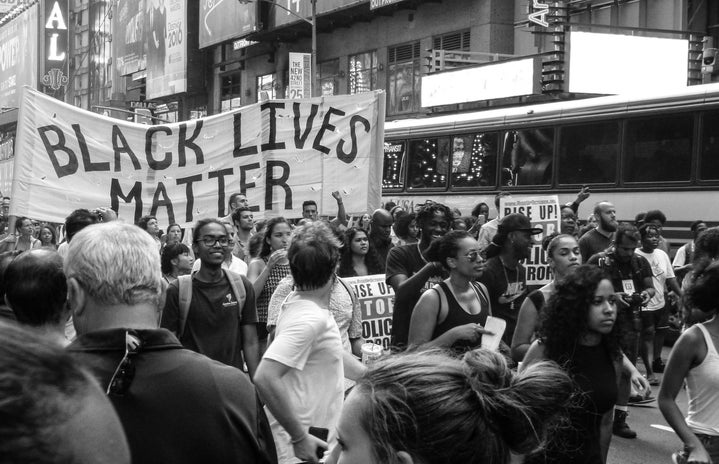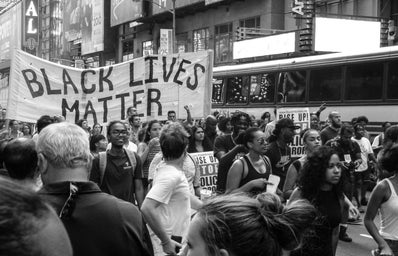DISCLAIMER: As a white woman, I do not understand the troubles and experiences that Black people face in America in any and all forms. I, in no way, am trying to speak on topics as if I fully understand the detrimental effects that police brutality and systemic racism has on the Black community.
Hi everyone, I want to start off by saying that I intend to write this article to be as informative and educational as possible, and simply want to take advantage of this platform and my ability to educate/inform those who may be confused on the Black Lives Matter movement, police brutality, White privilege, and/or systemic racism as a whole.
Some of you may be asking yourselves, or have family members wondering, what is the Black Lives Matter movement? The Black Lives Matter (BLM) movement was created in 2013 by Opal Tometi, Patrisse Cullors, and Alicia Garza after the unlawful killing of Trayvon Martin. It is a movement dedicated to ending the violence and discrimination against the Black community. While it is a movement that advocates for the diminishing of racism as a whole, it is mainly targeted towards the most powerful systems and organizations within our country. It aims to raise awareness and start a conversation around the violence done upon the Black community by those in positions of power, as well as the lack of accountability held for those actions. A common point made by those who are just being introduced to the BLM movement, or have known about it for some time, is “Well, don’t All Lives Matter?”. Which, yes, all lives DO matter. However, that is not at all what the Black Lives Matter movement is saying. What this movement is trying to say is for as long as we can remember, there has been an overwhelming amount of oppression faced by the Black community. The criminal justice system has failed them from slavery to the Jim Crow era, to the Civil Rights movement/act, to the unjust killings of many black men and women today; Trayvon Martin, Tamir Rice, Sandra Bland, Eric Gardner, Mya Hall, Mike Brown, George Floyd, Breonna Taylor, Ahmaud Arbery, and the list continues. BLM aims for justice and peace. BLM wants these systems that hold so much power in this country to treat Black Americans like their lives matter. Black Lives Matter wants law enforcement to stop taking innocent lives and letting the perpetrators get away with it.
A large argument made by many people is that “police brutality happens to White people too!”, which is true, but right now we are focused on the police brutality faced by the Black community at an alarmingly high rate. Based on statistics found in the article, “Mapping Police Violence” from 2019, Black people are 3 times more likely to be killed by a police officer than a White person, and 1.3 times more unlikely to be unarmed than a White person. Keep in mind that 24% of police killings were Black people in 2019 and they make up 13% of the population. I would also like to point out that it does happen to White people. However, if the only time you are bringing up that it happens to White people is during a conversation about police brutality towards Black people, there are two issues. One, saying things like, “Well, it happens to White people too”, completely disrespects and undermines the experiences of oppression and injustice faced by the Black community. Your goal in a conversation revolving around the topic of police brutality against Black people should be to understand and listen to their pain, as well as the experiences they have to share in order to learn and become educated on the things that are happening around us every day. Your goal is not to undermine and devalue their experiences. Two, if you acknowledge the fact that innocent White people are victims of police brutality too, why aren’t you angry as well? Why aren’t you fed up with police brutality?
The last talking point I want to touch upon is the concept of White Privilege and Systemic Racism. White privilege is something a lot of people see as a guilt tactic used by People of Color (POC) or activists when talking about racism or inequality in America. When, in reality, it is simply something all White citizens carry around with us without even noticing or asking for. It is not undermining our own personal hardships or troubles we have faced that can be similar in certain ways to POC. Rather, it is explaining that there are many things we get to do without fear that many don’t. It is the ability to go for a jog or to get pulled over without fearing for your life. It is the ability to not watch people cross the street when they see you walking on the same side as them, to not have women clutch their purses a little tighter when you stand close in line or on an elevator, to have the ability to learn about racism rather than experience it your entire life. White privilege is something we all need to recognize. We need to use our advantage and speak out on these issues for those who aren’t heard and amplify the messages that are often lost throughout times like these.
Systemic racism is another concept where we have the privilege of going throughout our day to day life without really noticing. To put it simply, systemic racism is the policies, laws, and practices set in place which work to perpetuate discrimination against Black people and all POC. Instead of it being something that is found on an individual level, it is found within the most powerful systems in our country. This includes the economy, the criminal justice system, and the educational system. The list goes on and on. It is something often overlooked due to the fact that it is built within the infrastructures of the systems that play a large role in our everyday life. This has gone on for as long as our country has been established. Examples of this include but are not limited to: The economic inequalities faced within races, the staggering difference in education, the funding for said education based on neighborhoods or race populations within schools, the many wrongful convictions upon the Black community and POC, along with the lack of injustice served in many cases. These topics are areas we all need to become educated on and be more aware of.
In essence, I would like to say to the Black community, I stand with you. I hear you. I will continue to learn and educate myself on the hardships and oppression you all face. I will be an ally. I will use my privilege and my voice to stand up for you. I will try and dismantle the systemic racism in this country. I will never fully understand those experiences, but that will not stop me from fighting for you.
All Lives Won’t Matter Until Black Lives Matter.
To Donate:
Black Lives Matter Movement: https://secure.actblue.com/donate/ms_blm_homepage_2019
Justice For Breonna Taylor: https://www.gofundme.com/f/9v4q2-justice-for-breonna-taylor
George Floyd’s Daughter, Gianna, Fund: https://www.gofundme.com/f/gianna-floyd-daughter-of-george-floyd-fund
The George Floyd Memorial Fund: https://www.gofundme.com/f/georgefloyd
These are just some of the many GoFundMe’s that can be found all over the internet, along with various petitions.



